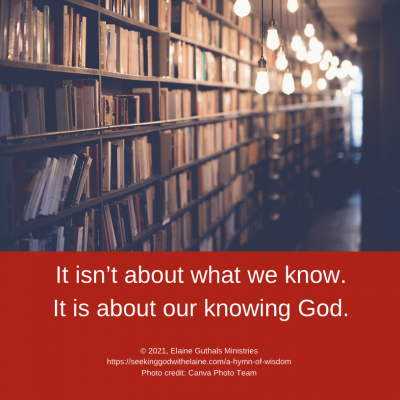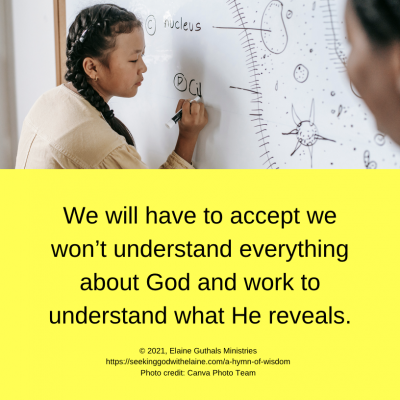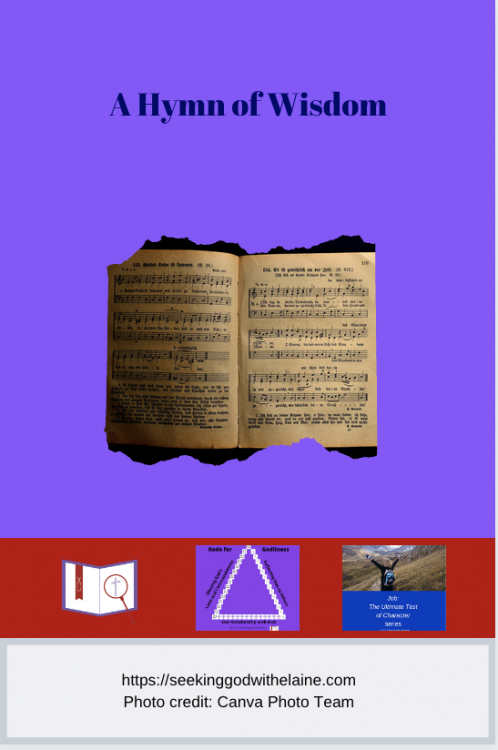Job’s response to the third round of discussions included a discussion on wisdom. This daily devotional looks at the importance of knowing God.
Nuggets
- To be a disciple we must look for wisdom.
- Wisdom can only be obtained through knowing God.
- God is all-knowing; therefore, we should reverence Him.
Devotions in the Job: The Ultimate Test of Character series

We are in round three of the friends’ discussions with Job. We can tell they are frustrated because they throw out all sorts of false accusations.
Eliphaz accused him of abusing others, especially widows and orphans. Bildad accused him of being a total degenerate.
This round was different. Zophar did not join in the accusation-fest.
This poem comes after Job’s response. Well, it may be part of it. Bible scholars are divided about if it is or not.
Let’s go through it and see what it tells us.
Let's Put It into Context
Here is a running list of what we’ve discussed previously.
The Need for Wisdom
“But where can wisdom be found, and where is understanding located? No one can know its value, since it cannot be found in the land of the living. The ocean depths say, ‘It’s not in me,’ while the sea declares, ‘I don’t have it.’ Gold cannot be exchanged for it, and silver cannot be weighed out for its price. Wisdom cannot be valued in the gold of Ophir, in precious onyx or lapis lazuli. Gold and glass do not compare with it, and articles of fine gold cannot be exchanged for it. Coral and quartz are not worth mentioning. The price of wisdom is beyond pearls. Topaz from Cush cannot compare with it, and it cannot be valued in pure gold” (Job 28: 12-19 CSB)
To be a disciple we must look for wisdom.
Bevan reminded us that it is the combination of a moral quality and a spiritual quality that makes us disciples. That is why we can’t be a disciple just by being a good person.
Resource
The Homilist noted that this chapter is about man’s power and weakness. We have the “… power to supply the material necessities of his nature, and his weakness to supply his mental cravings.”
It is hard to remove moral intellectual difficulties. The Homilist said that it really isn’t something on which we can read self-help books.
The persistent application of moral virtues to our lives because of our supreme love for God gives an answer to the removing our intellectual difficulties. In order to do that, we have to understand wisdom.
Wisdom is an enlightened acceptance of God’s principles that leads to knowledge, discernment, and good sense that is put into practice through salvation, increasing our goodness and virtue.
Stanley said that wisdom is the quest for knowledge. It is the desire to know.
Resource
We have to put this into perspective. This isn’t the quest to determine how God made the world or some other burning question we want answered. It is the quest to determine Who God is and how we can imitate Him.
But we’ve said over and over that it isn’t head knowledge. It has to be heart knowledge. Stanley said we have to actively use what we know to distinguish between good and evil.
- Good, in the biblical sense, is the workings of God within His people.
- Evil is equated with sin because it is that which goes against God and His purposes.
There is one thing we have to keep in mind, though. Stanley wrote, “No doubt wisdom is not in itself goodness.”
Resource
Wisdom helps us start with faith and continue in obedience.
Bevan made an interesting statement. He wrote, “The relation of man to God includes the deep enigmas of sin and evil, the large speculation of freedom, necessity, responsibility, and law.”
Resource

We get the sin versus evil. It is the freedom, necessity, responsibility, and law that can get us.
Sometimes, we don’t understand how freedom and responsibility mesh. We think freedom means we can do anything we want to do. Responsibility doesn’t always fit into that, because we see responsibility limiting our freedom.
The same can be said for freedom and law. Law limits freedom even moreso, we think.
We feel like necessity is limiting, also. Having to do something takes our freedom of choice away.
We like to think we are really powerful. A relationship with God shows how limited our power is — and how powerful He is.
Finding Wisdom
“Where then does wisdom come from, and where is understanding located? It is hidden from the eyes of every living thing and concealed from the birds of the sky. Abaddon and Death say, ‘We have heard news of it with our ears’” (Job 28: 20-22 CSB)
Wisdom can only be obtained through knowing God.
Vaughan made the comment that science stands in the way of reconciling with God. He said that this was so — “… even more than the dogmatism of theology.”
Resource
Science keeps the focus on whether we can figure out what really happened or how it is. I don’t think it is trying to figure out how God did it. I think science is trying to prove that He didn’t.
Why do I think this? I agree with Vaughan. He wrote, “The moment you come with your dogmas to measure and explain everything, that moment the mystery, the vastness, the grandeur, begin to vanish.”
Resource
We have to realize that worldly knowledge without spiritual knowledge is worthless. Cadman wrote, “Science may give knowledge, but cannot attain wisdom.”
Resource
It isn’t about what we know. It is about our knowing God. Only spiritual knowledge will help us in the end.

God’s Wisdom Requires Reverence
“But God understands the way to wisdom, and he knows its location. For he looks to the ends of the earth and sees everything under the heavens. When God fixed the weight of the wind and distributed the water by measure, when he established a limit for the rain and a path for the lightning, he considered wisdom and evaluated it; he established it and examined it. He said to mankind, ‘The fear of the Lord — that is wisdom. And to turn from evil is understanding’” (Job 28: 23-28 CSB)
God is all-knowing; therefore, we should reverence Him.
One of God’s attributes is that He is omniscient. God’s wisdom is sufficient that it puts Him in control. He will never once say, “Ooo, baby. I did not see that coming.”
To read a related devotion, click the button below.

We will have to accept we won’t understand everything about God and work to understand what He reveals.
Then we get to fear of the Lord. We’ve talked about that many times. In fact, that is the topic for our discussion for this year.
Godliness, equated with the Old Testament term fear of the Lord, is reverence in thought, feeling, and conduct that is promoted by walking in His Spirit and obeying God’s laws and commandments and produces a moral likeness of God.
Tillotson noted fear of the Lord was one of the catch-all phrases used in Scriptures. He wrote, “To fear the Lord’ and to ‘depart from evil’ are phrases which the Scripture useth in a very great latitude to express to us the sum of religion and the whole of our duty.”
Resource
Why is fear of the Lord important? “The fear of the LORD is the beginning of wisdom; all who follow his precepts have good understanding. To him belongs eternal praise” (Ps. 111: 10 NIV).
Shiels noted that, to properly fear Him, we had to properly know Him. We have to know the attributes He possesses.
To read a devotion in the Finding Our Center
According to Shiels, fearing God means we don’t want to disobey Him. It makes us want to know everything about Him.
The Homiletic Magazine told us how fearing the Lord brings happiness.
- It removes moral impediments to our happiness.
- Restoration to purity brings happiness.
- It infuses sober habits.
- It provides comfort in trials.
Resource

Making the Connections
Pratt noted that, “to fear the Lord is wisdom; to depart from evil is ‘understanding.’” That makes sense to me.
We have to understand enough to make the choice to turn to God. We aren’t going to know everything. To show God reverence is to acknowledge that He does know everything.
Resource
How Do We Apply This?
- No matter what, trust in God.
- Recognize that we will understand everything in eternity.
- Get rid of the sinful feelings.
- Follow God’s laws and commandments.
- Be humble.
Resource
Father God. Lord, we want to know You. Give us the wisdom we need to understand what we need to in order to submit to You. Amen.
What do you think?
Leave me a comment below (about this or anything else) or head over to my Facebook group for some interactive discussion.
If you don’t understand something and would like further clarification, please contact me.
If you have not signed up for the email daily or weekly providing the link to the devotions and the newsletter, do so below.
If God has used this devotion to speak with you, consider sharing it on social media.